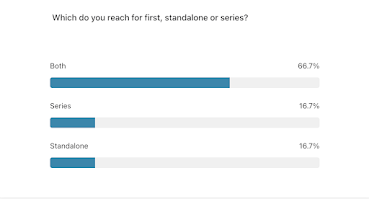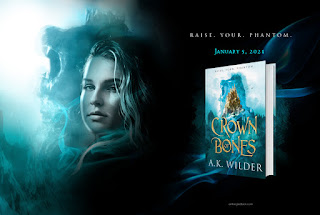 |
| Anime Wallpaper |
Last month we explored reading preferences in Fantasy - series, or standalone.
It boiled down to a basic argument where the beauty of a standalone is containment. When you pick it up, you have the story complete from beginning to end -- no cliffhangers, no unresolved plots.
And the beauty of a series? It may not be an all in one volume or even all in three, but oh the depth and breadth it can obtain. A series can extend over continents, worlds, and generations as we grow with our characters, friends and foes alike. And talk about convoluted plots and sub-plots. There's room for so much more.
Yet the results surprised me. I thought sure it would be series all the way for Fantasy readers but no, the BOTHS had it!
Here's what the survey found
And now, I have another question, this time on a form that will 100% work. Shout out in the comments if not. We have our eyes trained there.
Audio, Digital, or Print?
I'm keen to find out HOW you like to read. Is it Audio? Digital? Or good old paper, binding and print?
Audiobooks
 |
| YaoYao Ma Van As |
Studies show that listing to an audiobook builds critical listening and thinking skills, improves language, pronunciation and vocabulary, and, like all digital books, they can be stored in your pocket and easy to take with you wherever you go. The other major advantage over any other form of reading is accessibility for the person who is visually impaired or blind.
The only drawback I can think of is when you don't gel with the narrator(s). That can make an amazing story hit the DNF pile fast, or not make it past the audio sample before you buy.
Speaking of... the cost. Audio is more than eBook or paperback, but you can join streaming sites like Audible for deals and credits. It's what I do.
eBooks
 |
| YaoYao Ma Van As |
Like the audiobook, eBooks are stored in one, virtual space that you can take with you easily, wherever you go. There is also the handy ability to adjust font size and brightness, reducing eye strain. Though they do use energy and have an ongoing carbon footprint, 2.2+ million books are published each year, using around 3 million trees, so they are environmentally friendly in that respect.
Print Books
 |
| YaoYao Ma Van As |
Paper cuts aside, print books engaged the senses in ways digital versions cannot. Print books are tangible, with stunning cover art, illustrations and character that is, maybe not better or worse than digital, but it can be preferable.
Print books line your shelves, drawing you to them in a way your ebook or audiobook list doesn't because the print form is real. In a world becoming more digital by the second, a physical book might ground us in ways more advanced technology can't.
And the price? Let's look at a comparison.
Cost
As you can see, the paperback and eBook are not that far apart, nor is the audiobook from the hardback. And there are specials and discounts, dropping the digital price to $0 which you won't see in the physical variety.
In the end, it's a personal choice. I'd love to know what yours is!
Tap the form, or drop a note in the comments.
See you there
xxKim
* * *




_poster.jpg)









